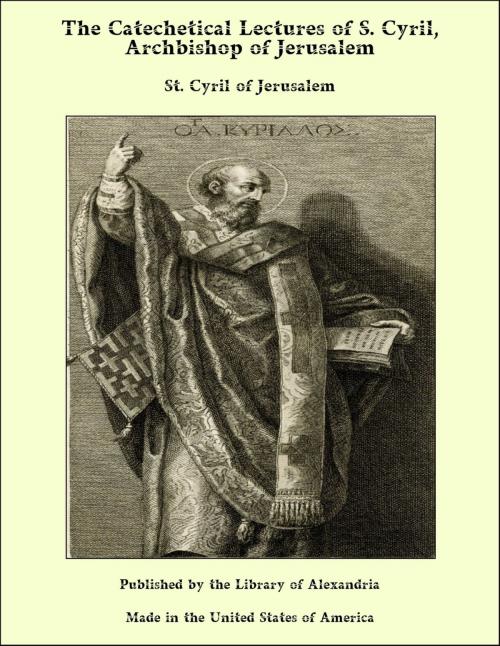The Catechetical Lectures of S. Cyril, Archbishop of Jerusalem
Nonfiction, Religion & Spirituality, New Age, History, Fiction & Literature| Author: | St. Cyril of Jerusalem | ISBN: | 9781613106358 |
| Publisher: | Library of Alexandria | Publication: | March 8, 2015 |
| Imprint: | Language: | English |
| Author: | St. Cyril of Jerusalem |
| ISBN: | 9781613106358 |
| Publisher: | Library of Alexandria |
| Publication: | March 8, 2015 |
| Imprint: | |
| Language: | English |
The works of S. Cyril of Jerusalem owe much of their peculiar interest and value to the character of the times in which he wrote. Born a few years before the outbreak of Arianism in a.d. 318, he lived to see its suppression by the Edict of Theodosius, 380, and to take part in its condemnation by the Council of Constantinople in the following year. The story of Cyril's life is not told in detail by any contemporary author; in his own writings there is little mention of himself; and the Church historians refer only to the events of his manhood and old age. We have thus no direct knowledge of his early years, and can only infer from the later circumstances of his life what may probably have been the nature of his previous training. The names of his parents are quite unknown; but in the Greek Menæa, or monthly catalogues of Saints, and in the Roman Martyrology for the 18th day of March, Cyril is said to have been "born of pious parents, professing the orthodox Faith, and to have been bred up in the same, in the reign of Constantine." This account of his parentage and education derives some probability from the fact that Cyril nowhere speaks as one who had been converted from paganism or from any heretical sect. His language at the close of the vii^th Lecture seems rather to be inspired by gratitude to his own parents for a Christian education: "The first virtuous observance in a Christian is to honour his parents, to requite their trouble, and to provide with all his power for their comfort: for however much we may repay them, yet we can never be to them what they as parents have been to us. Let them enjoy the comfort we can give, and strengthen us with blessings." One member only of Cyril's family is mentioned by name, his sister's son Gelasius, who was appointed by Cyril to be Bishop of Cæsarea on the death of Acacius, a.d. 366 circ. Cyril himself was probably born, or at least brought up, in or near Jerusalem, for it was usual to choose a Bishop from among the Clergy over whom he was to preside, a preference being given to such as were best known to the people generally.
The works of S. Cyril of Jerusalem owe much of their peculiar interest and value to the character of the times in which he wrote. Born a few years before the outbreak of Arianism in a.d. 318, he lived to see its suppression by the Edict of Theodosius, 380, and to take part in its condemnation by the Council of Constantinople in the following year. The story of Cyril's life is not told in detail by any contemporary author; in his own writings there is little mention of himself; and the Church historians refer only to the events of his manhood and old age. We have thus no direct knowledge of his early years, and can only infer from the later circumstances of his life what may probably have been the nature of his previous training. The names of his parents are quite unknown; but in the Greek Menæa, or monthly catalogues of Saints, and in the Roman Martyrology for the 18th day of March, Cyril is said to have been "born of pious parents, professing the orthodox Faith, and to have been bred up in the same, in the reign of Constantine." This account of his parentage and education derives some probability from the fact that Cyril nowhere speaks as one who had been converted from paganism or from any heretical sect. His language at the close of the vii^th Lecture seems rather to be inspired by gratitude to his own parents for a Christian education: "The first virtuous observance in a Christian is to honour his parents, to requite their trouble, and to provide with all his power for their comfort: for however much we may repay them, yet we can never be to them what they as parents have been to us. Let them enjoy the comfort we can give, and strengthen us with blessings." One member only of Cyril's family is mentioned by name, his sister's son Gelasius, who was appointed by Cyril to be Bishop of Cæsarea on the death of Acacius, a.d. 366 circ. Cyril himself was probably born, or at least brought up, in or near Jerusalem, for it was usual to choose a Bishop from among the Clergy over whom he was to preside, a preference being given to such as were best known to the people generally.















